Everyone’s view of time is different and deeply personal. The perception of time is entirely subjective and influenced by factors such as emotions, level of focus (attention), memory, our personalities, and even the speed at which our brain processes information received from our various senses. For instance, an extrovert at a party may feel that the night ended way too soon, while to an introvert at the same party, it could have felt like it lasted forever.
As such, while we can all say that time is precious and fleeting, there is no single answer for the question of what the best use of time is. It is vastly different person to person, depending on an individual’s life stage and circumstances.
No one else can really tell us how best to spend our time, except ourselves. Elevating our consciousness of how we are valuing our time, may therefore help us be more intentional in allocating it meaningfully.
Our lifetime as a human being is as fleeting as the day is for the Kankucho. In the finite hours that we both have, the Kankucho can build its nest to protect it from the inevitable cold and darkness after sunset, and human beings too can spend this lifetime eradicating negative karma and creating positive ones, devoting ourselves to the Three treasures and our Buddhist practice before inescapable death. However, it is easy to forget the sufferings from the previous night and past lives, when we are once again in the warmth and comforts of the sun and the many pleasures of this current life. And so the cycle of suffering tends to repeat.

In the world we live in today, there are more distractions than ever before, vying for our attention and precious time. We are constantly bombarded with information and entertainment in this digital age, which has eroded our attention span significantly when we are constantly seeking one instant gratification after another.
The creature comforts we enjoy in our daily life too, may make us lazy to practice, and then there are the many responsibilities at home, work and school that we need to fulfil, and which take up our time and energy.
Do you notice if any of these make it more challenging for us to allocate time and energy to doing Gongyo and Daimoku? Is it difficult to choose between attending a ceremony at the temple and a meet-up with friends if both events fall on the same day? Has our shortened attention span made it harder to concentrate while we are chanting? Being mindful of these may help us make more purposeful choices around what we do with our time.

As we go about our everyday life, there will be duties and obligations that we need to fulfill. We don’t have to forsake them for practice, but we can certainly weave time in between them for daily Gongyo and Daimoku, and visits to the temple, making practice an integral part of our everyday lives.
In modern day context, we do not need to lay our lives down to see the Buddha in the literal sense, but perhaps we can consider it to be the willingness to give of our time to seek the Gohonzon. With this mindset, we can more easily assign high importance to practice and offer our time for practice, which also may be a form of Gokuyo to the Buddha.
Furthermore, with an elevated consciousness of the value of our time, we can perhaps multi-task better! Work, school and social activities take up so much of our waking hours and we meet so many people during this time. All of them have that Buddha nature within them waiting to be awakened and many of whom are waiting for us to sow the seeds of faith. Time spent building rapport and relationships with colleagues and friends, family members and teachers etc., are not for nothing. Showing up for them and being a positive example and influence on them, goes a long way and can is like investing time in the other very important Buddhist practice of Shakubuku, that perhaps we have been unaware of. The time we spend with people around us can hold tremendous value in supporting and propagating the Law.
“Single-mindedly chant Nam-myoho-renge-kyo and urge others to do the same; that will remain as the only memory of your present life in this human world.”
(Gosho: ”Questions and Answers on Embracing the Lotus Sutra”, pg 300)
In whichever way we define the value of time and use it, it is precious and limited. What memories will you make with yours in this present lifetime?
New to Nichiren Shoshu? Read more about us here.
We're most happy to welcome you to Kaimyo-in, do reach out to us here so we can assist you directly!


